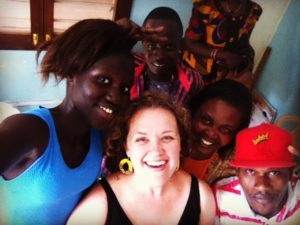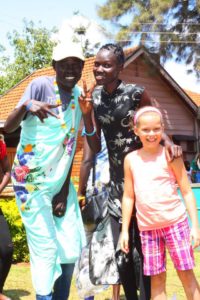A late addition to this post: There’s another step you can take to stand with refugees. Consider signing the UN’s #withrefugees petition here!
I want to introduce you to my friend Pawad. Pawad is South Sudanese, and he’s from the Dinka tribe. Physically, this means that when Pawad gives me a hug, the top of my head aligns with his armpits. It means that when he smiles with those white-white teeth against his 80% cacao skin, it’s as if someone flipped on a couple hundred watts of electricity. He’s built like a piece of black licorice, limbs long and loose.
Pawad is fully scholarshipped to African Renewal University in Uganda, after which he hopes to become a pastor to his people, many of whom have been traumatized by 35 years of war. Coincidentally, Pawad is also a refugee.
This past year, the millionth Sudanese refugee crossed over the Ugandan border. (Uganda is being studied for its exceptional success in a mutually beneficial relationship with refugees! See more here.) I asked him if I could share a snippet of his story with you. (He writes in English, his third language.)
Pawad’s Story
One day I was waked up by the sounds of weapons early in the morning at 5:00 AM. I do remember that day well it was on 23/12/2013 it was two days ahead to Christmas day I was very happy like any person in the world to see the birth of baby Jesus and to celebrate him as Lord. On that day I was confused where to run and what to do. My mother shouted at my door, “Pawad! Pawad! My son! My son! Come out and run to the church!”
I was hearing nothing because of sounds of all kinds of guns. On that day I got separated from my beloved people: my mother, father, brothers, sisters, friends, relatives, and my [tribal] people.
At 1:00 pm I found myself in ambush hearing voices “Set down! Set down! Raise your hand up!” and “Who? Who? Who are you? Where are you from?”
On that day I still remembered my words I speak to God: “Is this the end of my life, God?” I said, “Thank you for being faithful to me all this times.”
But somebody among them shout, “Leave him! Leave him! He is student; he is the future of this country.”
I laugh with tears in my inner most, asking God, “What you want me to do?”
I didn’t get answer until 2017 in January I spoke to myself, “Why God kept me alive up to this time, even no education?” suddenly I remember my question that I asked God on 24/12/2013 [Christmas Eve]: “What do you want me to do?”
I prayed and God gave me chance of study bachelor in theology full-scholarship from person I don’t know. On that day, I realized what God want me to do.
I try to imagine waking up on Christmas Eve to the sound of gunshots in my neighborhood, to bodies of my friends and coworkers lining my street. I try to picture what it would be like to have strangers discussing whether they should shoot me. I can attempt to think about leaving my family and trying to find some feasible transportation out of the country–would it be Mexico?–where I speak none of the language, where people hold me in contempt for my culture and because my skin has way too much melanin to be acceptable.
I can’t really do any of it justice.
Pawad has lived as a foreigner for six years. I first met him around 2014 at Refuge and Hope in Kampala, Uganda, where I taught for three years. (Developing nations host 80% of refugees…try to figure out the math on that one.) Though young–50% of all refugees are kids!–he so clearly had so much potential, still bright and enthusiastic and curious despite what he’d crawled out of. Refuge and Hope is where Pawad learned to read and write English; where refugees-turned-students from all over East Africa are learning business and computer skills, useful trades, health skills.

See, Pawad’s country has been at war since before he was born–since 1983. (How old were you that year?) He has never seen his country at peace. Some of our students at the refugee center had never before sat in a classroom. Turns out when you’re running for your life or trying to veer out of the way of conflict, learning to read or do math falls lower on the priority list.
When Refugees Give Back
Now, students like Pawad are giving back. They’re using the education–and hope–passed on to them by Refuge and Hope to invest in their own people (not to mention other Ugandans; as a reminder, in Kampala, 21% of refugees own a business that employs other people—and 40% of those employees are Ugandan nationals).
In light of the increase of students in refugee camps across Uganda and others dropping out of school for lack of support, Pawad has recently begun a coalition of South Sudanese youth. While others long to leave refugee camps, these young people long to return to refugee camps and other disadvantaged areas. Their vision? To train students in reconciling relationships and being peacemakers. To build spiritual leaders. To help them thrive in a foreign land. To help with the students’ physical needs.
Anyone else pretty humbled by this?
I Thought Wrong
See, we tend to have our ideas of refugees in a box, right? Maybe we think of them as takers or opportunists or even potential criminals. We might think of them as having less to offer. We might think of them as drain on society; as charity cases. I, for one, was surprised to find an engineer, a high school social studies teacher, and a human resources professional in my classes. (…Isn’t my husband in Human Resources?) With all the refugees my kids have hung out with, they’re still a little mystified by the stigmas surrounding their friends.

But organizations like Refuge and Hope recognize our relationship is not one of superior to inferior. It’s simply one of helping fellow human beings; of sharing what we have in abundance–whether it’s my knowledge of English, or Pawad’s compassionate heart. As I’ll write in a future post, helping the disadvantaged changes us.
What if we need each other?
Today, I encourage you to take action on behalf of those fleeing their homes and families so they can survive. It’s possible you could be helping the next Pawad to compassionately, courageously take their place in the world despite the ways they’ve been violently robbed. Help them, friends, turn ashes to beauty.
How can you help refugees right now?
- Donate generously to vetted organizations like Refuge and Hope.
- Intentionally, strategically love on refugees near you. You are only a Google search away from helping one of the most alienated populations in the United States. You can find ideas from this article by TED Talks, this one from the New York Times.
- Educate yourself on the realities of refugees around the world, and spread accurate information; you could start here.
Like this post? You might like
- What Comes to Mind When You Think “Refugee”?
- 3 Reasons I Welcome Refugees–and 3 Ways You Can, Too
- Thanksgiving Memos from a Bunch of Refugees







